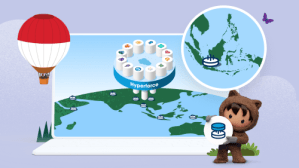4 Ways Thai SMEs Are Leading the Way in Digital Transformation



Read our analysis of SME trends data to find out why Thailand leads the way in digital transformation for small and medium businesses.

Kittipong Asawapichayon
Over the last few years, small and medium-sized enterprises (SMEs) in Thailand have embraced technology faster than many other countries, according to Salesforce’s latest research.
Thai SMEs faced a range of challenges related to customer expectations, and they adapted quickly. The determination they have shown in the face of adversity has been admirable. The rapid adoption of technology is a testament to the perseverance and creativity of SMEs and the communities in which they operate.
In the same research, Thai SMEs identified the following as the top three challenges they experienced in the past year:
- Keeping up with demand
- Providing a quality product
- Personalising customer engagement
This year’s Small and Medium Business Trends Report provides an insightful benchmark for what’s changed and what we can expect from SMEs if they move ahead. Digital transformation has peaked in Thailand, as the research showed that 100% of Thai SMEs have shifted their operations online and most believe that the shifts they’ve made will benefit their business in the long run. We can expect to see more contactless services in Thailand as up to 99% of Thai SMEs plan to offer contactless services permanently.
Based on the data presented in the Small and Medium Business Trends Report, we have pulled out four key themes important to Thai SMEs:
- Embracing the digital-first future
- Prioritising customer loyalty
- Meeting local employee needs
- Adopting technology
Embracing the digital-first future
The circumstances of the last few years forced many businesses to reappraise the way they worked, and the ways they engaged with their customers.
Despite some new restrictions on in-person interactions, communities and customers still want to support SMEs. In response, SME leaders are prioritising moving their businesses online, so they can connect with customers from the comfort of their homes.
One hundred percent of Thai SMEs have shifted their operations online to meet customer needs. Alongside this, 96% of SMEs in Thailand have said that changes they’ve made to their operations over the last two years will have a long-term benefit to their business.

This contrasts with the same data for the rest of the world. Internationally, the number of SMEs who have moved their operations online is a little lower. Ninety-five percent report that they have moved operations onto the Internet. Interestingly, only 75% of SME owners across the world think that the changes they’ve made will benefit their business in the years to come.
Prioritising customer loyalty
As Neeracha Taychakhoonavudh, Executive Vice President, Global Customer Success and Strategy, recently said, “customer loyalty is the new currency.”
Around the world, an average of 29% of SMEs said that they are prioritising the development of ongoing relationships rather than one-time transactions. In Thailand, this number is much higher: 51%.

After more than a year of adjusting to customer demand and bringing innovations to the fore, however, SMEs still face significant hurdles. These include personalising customer engagements, responding quickly to inquiries, engaging customers on their preferred channels, and providing a connected experience. This has proven that using the right technology will be the business differentiator for sustainability, success, and growth in this fast-changing environment.
Thai SMEs have adopted new practices to meet changing customer expectations. Our research has shown that 79% have offered more flexibility for customers and 75% are more careful about their communications. In addition, 68% have expanded the number of ways customers can reach them.
Local conditions change employee expectations
While customer expectations are changing, employee expectations are also evolving.
In Thailand, we saw that local conditions made a big difference in what employees were most concerned about. Among Thai workers, widespread vaccination against COVID-19 was the number one employee expectation. This was followed by mask usage and social distancing in the workplace.
In the rest of the world, access to flexible schedules was at the top of the list. Mask usage was also important to these employees, followed by the daily sanitation of their workspace and materials.

Whilst it can be interesting to look at the differences between SMEs around the world, it can also be illuminating to look at the similarities. SMEs everywhere have identified that employee trust and engagement is important, and the ways they earn that trust seem to be universal. Collaboration, responding to personal needs, and asking for employee feedback all feature high on the list of priorities, both in Thailand and around the world.
Adoption of technology
When we look at the adoption of CRM systems, there’s a significant difference. More than 80% of Thai SMEs have implemented a CRM system to help them maintain customer relationships and win deals. That’s compared to an average of only 56% globally.
Thai businesses have stepped up their adoption of technology systems for specific roles, too:
- Seventy-one percent of Thai SMEs have accelerated tech investments in customer service, compared to just 41% of global SMEs.
- When it comes to both sales and marketing, 68% of Thai SMEs have adopted technology solutions, whereas only 40% of global SMEs have done the same.
- For IT operations, 77% of SMEs in Thailand have adopted new tech solutions, compared to 39% of SMEs globally.
- Finally, 52% of Thai SMEs have implemented human resources solutions, against only 25% of SMEs around the world.

The majority of SME leaders (62%) cite technology as the reason that they have been able to stay afloat over the last few years. We have seen SMEs across the board adopting technology to solve a range of problems, such as marketing automation or collaboration.
The full Small and Medium Business Trends Report contains even more insight from around the world to help you succeed in 2022. Download a translated version in Thai here.




















